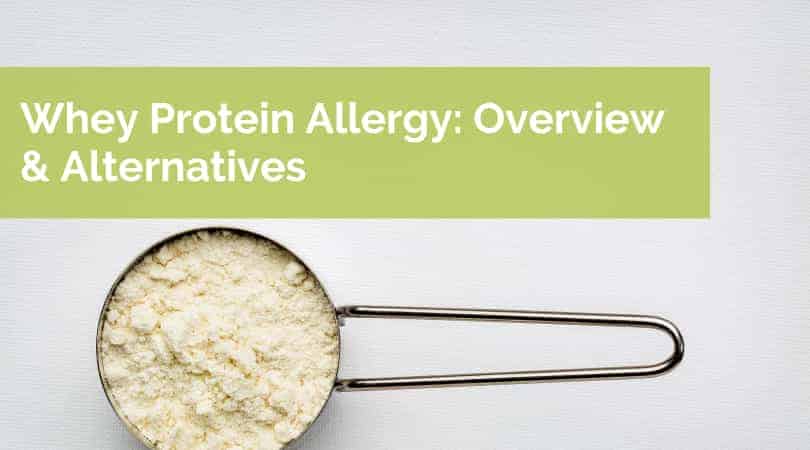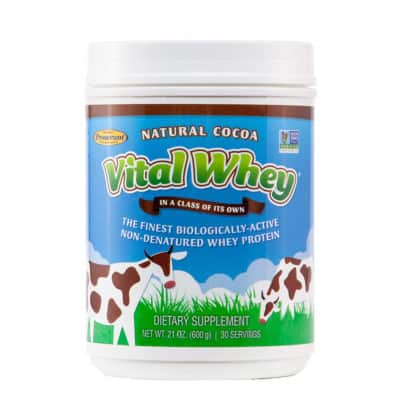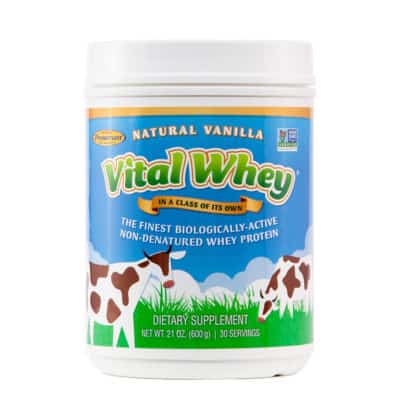
Whey protein is a commonly used ingredient in several packaged food items, particularly those used for sports performance, energy, meal replacement, and overall wellness. You’ve probably seen it in supplements, shakes, and protein bars.
Whey protein is a byproduct of the process of making cheese from dairy milk. Specifically, whey is the liquid portion of whole milk that is produced once the milk solids have been removed. Because of its origination from dairy, there are many people who cannot consume whey due to lactose intolerance or an allergy to cow’s milk.
Lactose Intolerance vs. Allergy
Lactose intolerance is a condition in which your body is unable to break down lactose, the main sugar found in cow’s milk. Common symptoms of lactose intolerance include diarrhea, nausea, upset stomach, and bloating after consuming dairy.
This reaction is a result of having a lack of lactase, the enzyme that normally breaks down lactose into its individual sugars, and makes it more easily digestible. When lactase is no longer present, lactose cannot be digested very well. Needless to say, lactose intolerance isn’t very pleasant, but it isn’t life-threatening.
Lactose intolerance is a very common condition. Nearly two-thirds of people around the world are affected by some degree of this condition. Many people begin losing their ability to digest lactose shortly after infancy, which explains why there are so many adults that cannot tolerate dairy products.
That being said, lactose intolerance is not the same as an allergy to milk or milk products. A true allergy, in any regard, is an immune response, whereas an intolerance to lactose means you’re missing the lactase enzyme.
A whey protein allergy is different from lactose intolerance. Whey protein is derived from dairy, people who have a dairy allergy may be at a higher risk for also being allergic to whey. So not only is a whey protein allergy possible, but, a whey protein allergy could become life threatening, whereas lactose intolerance is not — it’s more of a nuisance.
Does any of this sound like you? If you suspect you may have an allergy to whey protein or are lactose intolerant, understanding why your body is reacting this way is the key to dealing with the problem.
So what should you do if you want to use whey protein powder but are concerned that you may have a whey allergy or are lactose intolerant? Ultimately, you should check with your physician if you have any suspicion of being allergic to any foods. Allergies can have severe reactions and should always be taken seriously. Once checking with a healthcare professional, you may need to change your protein powder choice or adjust your dosage to avoid allergic reactions or discomfort from a lactose intolerance.
Understanding a Whey Protein Allergy
Again, a whey protein allergy is not the same as lactose intolerance. However, if you are lactose intolerant, you may have trouble with whey protein powder. This mostly depends on how sensitive you are to the protein, as it does contain some lactose.
An allergy is different from an intolerance. An allergy occurs when your body overreacts to a common substance, like milk. Because your immune system is in place to protect you from harm, it goes into overdrive, producing antibodies. This then causes the physical reactions you feel in an allergic reaction.
For example, an allergic reaction can cause side effects like itchy skin and hives, redness and swelling of the face and lips, and in more severe cases difficulty breathing — and potentially anaphylaxis and shock, which can be life-threatening and requires immediate medical attention. Basically, your body goes into attack mode against the whey and you suffer the consequences, which can be significant. Allergic reactions can cause varying effects depending on the individual.
What is a Whey Allergy?
If you’re allergic to cow’s milk, you are allergic to the protein in milk. You may be allergic to whey or casein. Some people can be allergic to both. So if you’re wondering can you be allergic to whey protein but not milk, the answer is no.
Unfortunately, if you find out you are allergic to casein, you still should avoid whey protein products. There is no guarantee that whey protein powders don’t contain small amounts of casein that could trigger an allergic reaction. Plus, it can be very difficult to manufacture products that contain one without trace amounts of the other, because of their shared origin.
Allergy to Whey Protein Powder Symptoms
If you have a whey allergy, you won’t necessarily experience allergic symptoms the first time you consume it. However, once you’re sensitized to it, your body can react poorly in the future upon contact.
Whey protein allergy symptoms can be experienced differently depending on the person. Some people are so sensitive that they might develop a rash on their skin when they simply open a container of whey protein. This is because the tiny dust-sized particles of whey protein floating around in the air can trigger an allergic reaction on the skin, leading to a rash or even an outbreak of hives.
People with this form of whey allergy will experience serious itching on their skin. This is due to immune compounds called histamines that are released by the body when you suffer an allergic reaction of the skin. Your hands and arms may become very sensitive or even swollen from fluid retention caused by the reaction. Those with whey protein allergies who ingest the protein may find that the skin around their mouth becomes irritated and their lips may swell up upon contact.
And that’s what happens BEFORE you consume whey protein! Not everyone reacts to this degree, but it is possible. The majority of those with a whey allergy will react more severely when they ingest whey directly versus when they come in contact with it through the air.
If you are allergic and you consume whey, once in your digestive system, you may experience red and watery eyes, a runny nose, sneezing and coughing. Whey protein may also trigger an allergic reaction that affects your lungs, preventing you from breathing.
If things are really bad, you may find that your breathing is impaired and your throat begins to tighten or close. This is a full-blown anaphylactic reaction, and is very serious. It can even be fatal if you aren’t treated immediately. If you ever think you are experiencing this, please treat it as an emergency and seek immediate medical attention.
You can also experience digestive problems, similar to lactose intolerance. When the protein hits your stomach and intestines, it can trigger diarrhea, nausea, stomach pains, intestinal cramps, bloating and gas.
Note: Consult with your doctor if you notice any of the symptoms of a whey protein allergy listed above. There’s a chance that it may not be caused by the whey protein at all, but by an added ingredient or another food altogether, so it’s best to be evaluated by a medical professional.
Dangers of Ignoring Your Whey Allergy Symptoms
If you do research on whey allergies, you’ll find that most people only experience either a mild allergic reaction to whey protein or digestive upset caused by lactose intolerance.
In fact, a real cow’s milk allergy is fairly rare in the United States. Up to 90% of people actually outgrow a cow’s milk allergy by the time they turn 3 years old.
However, technically an allergy can develop at any age. It’s important to be aware of what can potentially happen if you completely ignore signs of whey allergy, even if they’re mild.
Some people ignore the problem with whey protein, particularly if it doesn’t seem too serious and they may be assuming their responses is just lactose intolerance. If taking whey protein just causes mild indigestion or an upset stomach, it’s not too bad, right? Maybe, but maybe not.
If you ignore the symptoms, however mild, you may end up suffering from more serious health problems down the line.
For example, if you train yourself to ignore the mild indigestion that sets in as a result of your allergy or intolerance, you may end up ignoring more serious stomach and digestive problems caused by another underlying health issue. As a result, you could have no idea that you have a stomach virus or other infection in your digestive system, all because you are accustomed to the mild problems caused by your inability to process lactose.
For those who try to keep whey protein as a regular part of the diet despite an intolerance, there is also a potential risk of causing eventual damage to your digestive system. The villi in your intestines are designed to absorb the food you eat, but they become damaged over time when there are allergens in your digestive system.
Although the cause of digestive damage is somewhat of a mystery, research suggests that damaged intestines could eventually lead to a condition called leaky gut syndrome, where food is improperly digested and/or absorbed.
In this scenario, your intestinal permeability — or how easily things pass through the walls of your intestines — increases. This ultimately causes whey allergy symptoms like diarrhea, cramps, bloating, gas, and more. This is definitely not one of the problems you want to ignore, especially given the uncertainty around its consequences. Fortunately, some studies suggest that intestinal integry and permeability can be repaired and managed partly through dietary changes.
Overall, it’s important to give your body the attention it needs if you experience anything strange when consuming milk products or whey protein.
Regularly consuming whey protein despite your allergy or sensitivity could actually cause the symptoms to worsen. You may learn to tolerate the symptoms of whey protein allergies. But in doing so, you may also unknowingly increase your body’s susceptibility of becoming sensitive to other foods, like gluten, seafood, etc.
Whey Protein Isolate vs. Whey Protein Concentrate for Allergies
With so many whey protein products on the market, it can be hard to know which are most likely to cause allergy symptoms or be most irritating to someone with lactose intolerance.
There are three major types of whey protein, which vary based on the way they’re processed.
These include:
- Whey protein concentrate: This form of whey protein is the most common and contains between 70-80% protein. Of the three types of whey, concentrate retains the most minerals, fat, and lactose from milk.
- Whey protein isolate: This form contains less lactose, fat, and nutrients from milk, but offers significantly more protein — about 90%.
- Whey protein hydrolysate: This is a form of whey protein intended for faster absorption, as it’s pre-digested and broken down ahead of time.
Well Wisdom protein powders are all whey protein concentrates. In addition to the characteristics above, whey protein concentrates have higher proportions of the beneficial immune fractions in whey (like Immunoglobulins and Lactoferrin) but they can also have higher amounts of lactose than other forms of whey protein. This is because concentrates don’t undergo the extra intensive processing to remove the lactose, which is part of the process to make an isolate.
This also means that those suffering from severe lactose intolerance may experience symptoms when taking whey protein concentrates, depending on the amount present in the concentrate and the serving size. This may cause protein powder related diarrhea or other digestive symptoms.
If so, it might be better to reduce your serving size or switch to a whey protein isolate instead. While the native quality of the protein in an isolate will be lower, it will also contain less lactose, and thus may be easier for those with lactose intolerance to consume without suffering allergic reactions or otherwise annoying side effects.
Dairy Free Alternatives to Whey Protein
If you are allergic to whey protein or find that it triggers digestive symptoms due to lactose intolerance you will have to use a different product. Luckily, there are many alternatives on the market made from plant-based proteins or dairy-free egg protein.
Egg protein might be a good option for those seeking whey-free products. However, eggs are also one of the eight major allergens, so it is best to avoid this type of protein if you think you might also be allergic to eggs.
Plant-based proteins are a great choice and tend to be less allergenic than animal-based options. Soy protein is a plant-based complete protein, but might not be ideal for everyone. Most of the soy on the market is genetically modified, so this is something to be aware of when choosing a plant-based protein. To reduce your consumption of soy that has been genetically modified, look for soy protein powders that bear a Non-GMO Project or USDA Organic label.
Other good plant-based protein option is hemp protein powder. This can be an ideal option for individuals who are avoiding both dairy products and soy protein. Hemp is also high in beneficial omega-3 fatty acids.
Another option that works well for post workout needs, a blend of brown rice and pea protein might be ideal. These have been found to promote increased muscle strength and are also hypoallergenic and easily digestible.
Pea protein is another great alternative that is being seen more commonly now because of the ability to supplement products with great sources of protein without incorporating the top allergens.
Overall, there are many dairy free alternatives to whey protein that can be used if you have a true allergy or want to avoid it for other reasons. Finding a balance between whole foods and nutrition supplements can be a delicate balance, so working with a Registered Dietitian can be incredibly helpful when trying to coordinate a well rounded diet that provides you all the nutrients needed to stay healthy.
Frequently Asked Questions
Can you be allergic to whey protein but not milk?
No, if you are allergic to whey protein you will also be allergic to milk. All milk contains whey protein, therefore you would have the same reaction.
How do you know if you are allergic to whey protein?
The best way to know for sure is to speak with your healthcare provider. They may recommend that you try an elimination diet — meaning that you remove all sources of whey you’ve been using and slowly add them back to track side effects — and keeping a food diary to track suspicious foods and symptoms.
Can you be allergic to whey protein?
Yes! You can be allergic to any protein in milk, either casein or whey. The best way to know if you are allergic to whey is to speak to your doctor.
Bottom Line
Whey protein is a great option for people seeking a convenient and effective protein supplement, but it may not be right for everyone. If you suspect that you may have a whey allergy, but aren’t sure what’s triggering it, it’s best to seek an evaluation by a medical professional trained in food allergies. This is particularly important if you have the classic allergy symptoms, like hives, itchy eyes, or a scratchy throat after consuming whey. These symptoms can become more severe over time and it is best to avoid the food that is triggering them.
Speaking to a medical professional can help you best examine and figure out your symptoms. With the appropriate approach to whey protein allergy treatment, you’ll know exactly what your body doesn’t like about whey protein or if it is another ingredient or food that is causing the problem. This way it will be easier to prevent unwanted allergic reactions to protein shakes or other whey-based supplements. And rest assured that if you ultimately cannot consume whey protein, there are plenty of alternatives that can be just as good for your lifestyle without the potential side effects.
If you suspect that you have a milk or whey protein allergy, it’s important to first be aware of the symptoms.
Recommended Products:
References
- https://www.ncbi.nlm.nih.gov/books/NBK532285/
- https://medlineplus.gov/genetics/condition/lactose-intolerance/
- https://www.foodallergy.org/resources/milk-allergy-vs-lactose-intolerance
- https://pubmed.ncbi.nlm.nih.gov/12487202/
- https://pubmed.ncbi.nlm.nih.gov/31076401/
- Should You Take Whey Protein Powder After Surgery? - March 2, 2023
- How Much Protein is Too Much? - January 30, 2023
- Is Whey Protein Keto Friendly? - January 30, 2023







